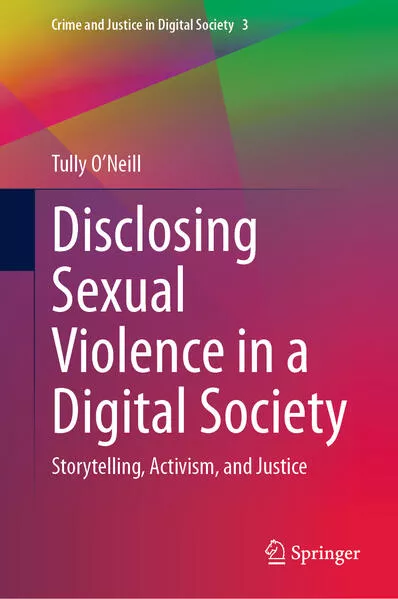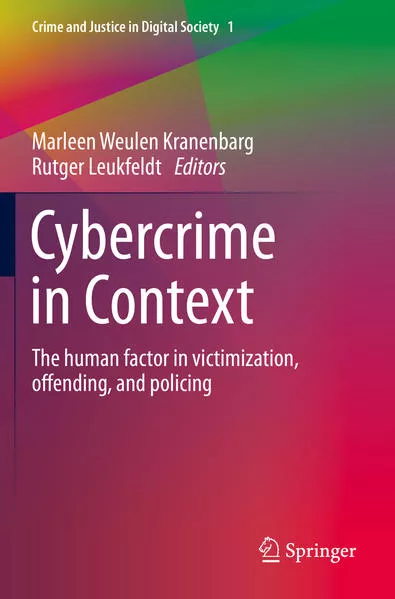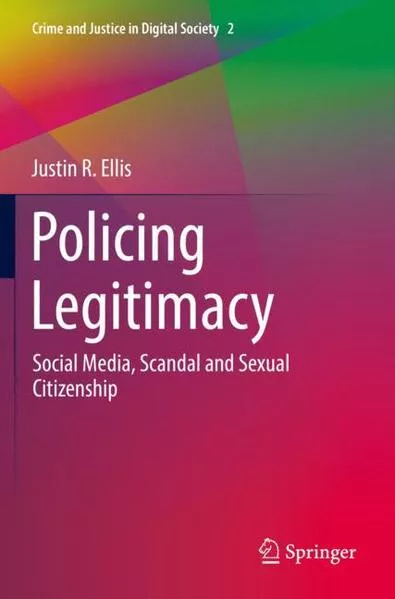Chronologie aller Bände (1 - 3)

Die Reihenfolge beginnt mit dem Buch "Disclosing Sexual Violence in a Digital Society". Wer alle Bücher der Reihe nach lesen möchte, sollte mit diesem Band von Marleen Weulen Kranenbarg beginnen. Der zweite Teil der Reihe "Policing Legitimacy" ist am 02.08.2022 erschienen. Mit insgesamt 3 Bänden wurde die Reihe über einen Zeitraum von ungefähr 3 Jahren fortgesetzt. Der neueste Band trägt den Titel "Disclosing Sexual Violence in a Digital Society".
- Anzahl der Bewertungen für die gesamte Reihe: 1
- Ø Bewertung der Reihe: 3
- Start der Reihe: 04.05.2022
- Neueste Folge: 16.11.2024
Diese Reihenfolge enthält 3 unterschiedliche Autoren.
- Autor: O’Neill, Tully
- Anzahl Bewertungen: 0
- Ø Bewertung:
- Medium: Buch
- Veröffentlicht: 16.11.2024
- Genre: Krimi
Disclosing Sexual Violence in a Digital Society
This book examines the various ways that victim-survivors disclose sexual violence in digital settings and theorizes the extent to which these practices constitute a new and informal 'justice' occurring in digital space. It features qualitative research interviews conducted with victim-survivors who disclosed sexual violence online and analyzes digital spaces utilized by survivors for the purposes of support, healing, and connection.
The volume provides insight into how and why victim-survivors use digital technologies to pursue ‘justice’ and the decision-making processes they undertake in order to navigate digital space after sexual violence. It expands on the theorization of informal justice in digital society and its potential implications. It focuses particularly on the experiences of justice for victim-survivors in the aftermath of sexual violence, highlighting the complexities of disclosing rape, sexual assault, and abuse in digital space.
- Autor: Weulen Kranenbarg, Marleen
- Anzahl Bewertungen: 1
- Ø Bewertung: 3.0
- Medium: Buch
- Veröffentlicht: 04.05.2022
- Genre: Krimi
Cybercrime in Context
This book is about the human factor in cybercrime: its offenders, victims and parties involved in tackling cybercrime. It takes a diverse international perspective of the response to and prevention of cybercrime by seeking to understand not just the technological, but the human decision-making involved.
This edited volume represents the state of the art of research on the human factor in cybercrime, addressing its victims, offenders, and policing. It originated at the Second annual Conference on the Human Factor in Cybercrime, held in The Netherlands in October 2019, bringing together empirical research from a variety of disciplines, and theoretical and methodological approaches.
- Band: 2
- Autor: Ellis, Justin R.
- Anzahl Bewertungen: 0
- Ø Bewertung:
- Medium: Buch
- Veröffentlicht: 02.08.2022
- Genre: Krimi
Policing Legitimacy
This book critically analyses the impact of digital media technologies on police scandal. Using an in-depth analysis of a viral bystander video of police excessive force filmed at the 2013 Sydney Gay and Lesbian Mardi Gras Parade and uploaded to YouTube, the book addresses the ways social media video sousveillance can shape operational and institutional police responses to police misconduct.
The volume features new research on the immediate and longer-term impacts of social media-generated police scandal on police legitimacy and accountability and responds to inherent questions of procedural justice. It interrogates the technological, political and legal frameworks that govern the relationships between the police and LGBTQI communities in Australia and beyond through the ‘social media test’ – the police narratives created and contested through social media, mainstream media, and police media. In doing so, it considers the role of sexual citizenship discourse as a political, economic and social organizing principle.
A comprehensive and interdisciplinary understanding of ‘digital’ and ‘queer’ criminology, this is an essential read for those working at the intersection of criminology and the digital society, queer criminology, and critical criminology.


